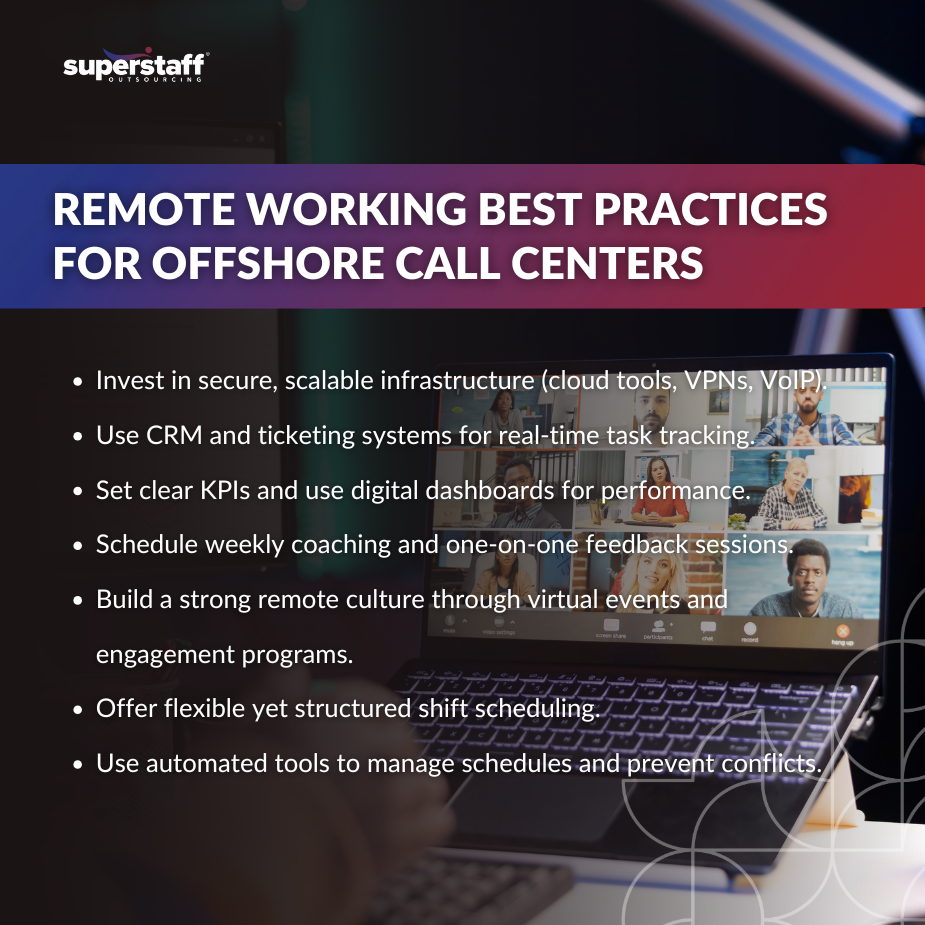
The remote work model is here to stay, but productivity concerns haven’t gone away—especially for customer-facing roles like those in call centers. As more companies embrace hybrid and distributed teams, the challenge lies in keeping performance high without the structure of a traditional office. For offshore call centers, this shift has prompted a complete rethink of operations, from how agents are onboarded to how performance is measured, supported, and sustained.
To stay competitive, leading BPOs have developed and refined a new set of remote working best practices—strategies that not only preserve productivity but often enhance it. These range from tech-enabled monitoring tools and flexible shift management to virtual team-building and remote-first leadership training.
In this blog, we’ll take a deep dive into how top offshore call centers maintain productivity, accountability, and agent engagement in today’s flexible work environments. If you’ve ever wondered whether outsourcing still delivers in a remote or hybrid model, this guide will show you why the answer is a confident yes.
Remote Infrastructure Built for Scale
Productivity starts with the right tech stack and secure infrastructure. Offshore BPOs understand that without a strong digital foundation, even the most talented agents will struggle to perform. That’s why leading call centers that outsource to the Philippines invest heavily in infrastructure built specifically for hybrid and remote operations.
Cloud-based systems and virtual desktops allow agents to work securely from anywhere, while VoIP solutions ensure seamless call quality. Enterprise-grade internet redundancies eliminate connectivity interruptions that would otherwise impact customer service levels. VPNs and endpoint security tools protect sensitive customer data, especially important in regulated industries like finance and healthcare.
Meanwhile, CRM and ticketing platforms enable real-time task tracking, so managers can monitor work progress without hovering. These digital ecosystems are central to remote call center management best practices, empowering offshore teams to deliver consistently high-quality service.
But technology alone isn’t enough—operations must be restructured for virtual-first efficiency.
Structured Performance Management Systems
Productivity thrives on clarity, accountability, and feedback loops. Offshore call centers use digital key performance indicators (KPIs) and real-time dashboards to keep remote teams aligned and focused.
For remote customer service jobs, performance metrics like call resolution rates, quality assurance (QA) scores, and adherence to shift schedules are carefully tracked. Productivity monitoring tools, such as time trackers or activity logs, help managers identify performance gaps—but these are implemented with transparency to avoid creating a culture of distrust.
Weekly one-on-ones and coaching sessions create space for two-way feedback and personalized support. Agents don’t just hear about their numbers—they also get guidance on how to improve, boosting morale and accountability.
These systems help track output, but keeping teams engaged takes more than numbers.

Building a Strong Remote Culture
High-performing offshore teams foster connection—even when apart. Culture is the glue that holds remote teams together, especially in call centers where collaboration and morale directly impact service quality.
To maintain a strong sense of community, top BPOs hold virtual town halls, daily huddles, and team-building activities. Recognition systems like employee of the month shout-outs or peer-to-peer kudos help celebrate achievements in real time.
Some companies appoint dedicated engagement officers who oversee employee wellness and design remote-first events. Initiatives like virtual fitness challenges, mental health webinars, and online interest groups help agents feel connected beyond their daily metrics.
Culture ensures long-term engagement, while smart scheduling keeps daily momentum high.
Flexible Yet Accountable Scheduling
Offshore teams maintain 24/7 coverage through dynamic, time-zone-aligned shifts. The best offshore call centers offering remote customer service jobs strike a balance between flexibility and structure.
Staggered or split shifts enable agents to work during their most productive hours, which reduces burnout and increases engagement. In hybrid setups, rotational in-office days help maintain face-to-face interaction while preserving flexibility.
To streamline the process, BPOs use automated scheduling tools that minimize conflicts and ensure optimal coverage across time zones. These tools factor in agent preferences, performance data, and client needs to build effective rosters.
Beyond scheduling, collaboration tools support seamless teamwork and communication.
Real-Time and Asynchronous Collaboration Tools
Strong communication systems keep teams productive and connected. Offshore BPOs implement a hybrid communication strategy that blends real-time and asynchronous tools for different needs.
Slack, Microsoft Teams, and Zoom power instant communication and huddles, while tools like Confluence or Google Workspace serve as knowledge hubs for asynchronous collaboration. Ticket-based workflows in platforms like Zendesk or Freshdesk reduce duplication and ensure that no issue falls through the cracks.
Asynchronous standups and project boards give managers a clear view of what everyone is working on—without needing to micromanage. This clarity fosters trust and accountability across geographically dispersed teams.
Communication practices evolve with leadership—especially in hybrid environments.
Leadership in a Remote Setting
Offshore BPOs train managers specifically for hybrid team leadership. Leading in a remote setting requires a new skillset built around empathy, clarity, and consistency.
Remote-first leadership training focuses on outcomes rather than micromanagement. Managers are taught to measure productivity by impact—not activity—and to lead with emotional intelligence. Regular leadership check-ins give team members space to voice concerns, share wins, and receive mentorship.
Supervisors also play a key role in reinforcing remote working best practices by modeling accountability, responsiveness, and flexibility. The result is a leadership culture that empowers agents while delivering client results.
When all these elements work together, offshore productivity becomes a strategic asset.
The Results: Better Than Pre-Pandemic Benchmarks
Many offshore call centers report higher productivity under hybrid models. In fact, remote structures often outperform traditional setups when managed properly.
Key metrics like cost-per-resolution, customer satisfaction scores, and agent retention have improved in the post-pandemic era. One major reason is the improved work-life balance that remote customer service jobs provide, leading to lower burnout and higher motivation.
Attrition, a longstanding challenge in the call center industry, has also dropped for many offshore BPOs. With fewer agents commuting or facing rigid schedules, they’re more likely to stay long-term. U.S. clients benefit from this consistency, with more experienced agents delivering better service.
These outcomes make it clear: when you outsource to the Philippines or other top BPO destinations, you’re not compromising by going remote—you’re gaining a competitive advantage.
With the right partner, your hybrid offshore team can become a long-term performance engine.
Enjoyed These Remote Working Best Practices? Follow SuperStaff for More Helpful Content
Offshore call centers have adapted to remote and hybrid models with impressive success—through smart tech, proactive leadership, and people-first policies. From secure infrastructure and flexible scheduling to culture-building and outcome-based management, today’s offshore BPOs are proving that remote productivity isn’t just possible—it’s often superior.
As businesses continue to evolve their operations, choosing the right outsourcing partner becomes more important than ever. Look for one that has mastered remote working best practices and understands the nuances of remote call center management best practices.
Looking to build a high-performing offshore team that thrives in any work setup? Let’s talk about how SuperStaff can make hybrid outsourcing work for you.






